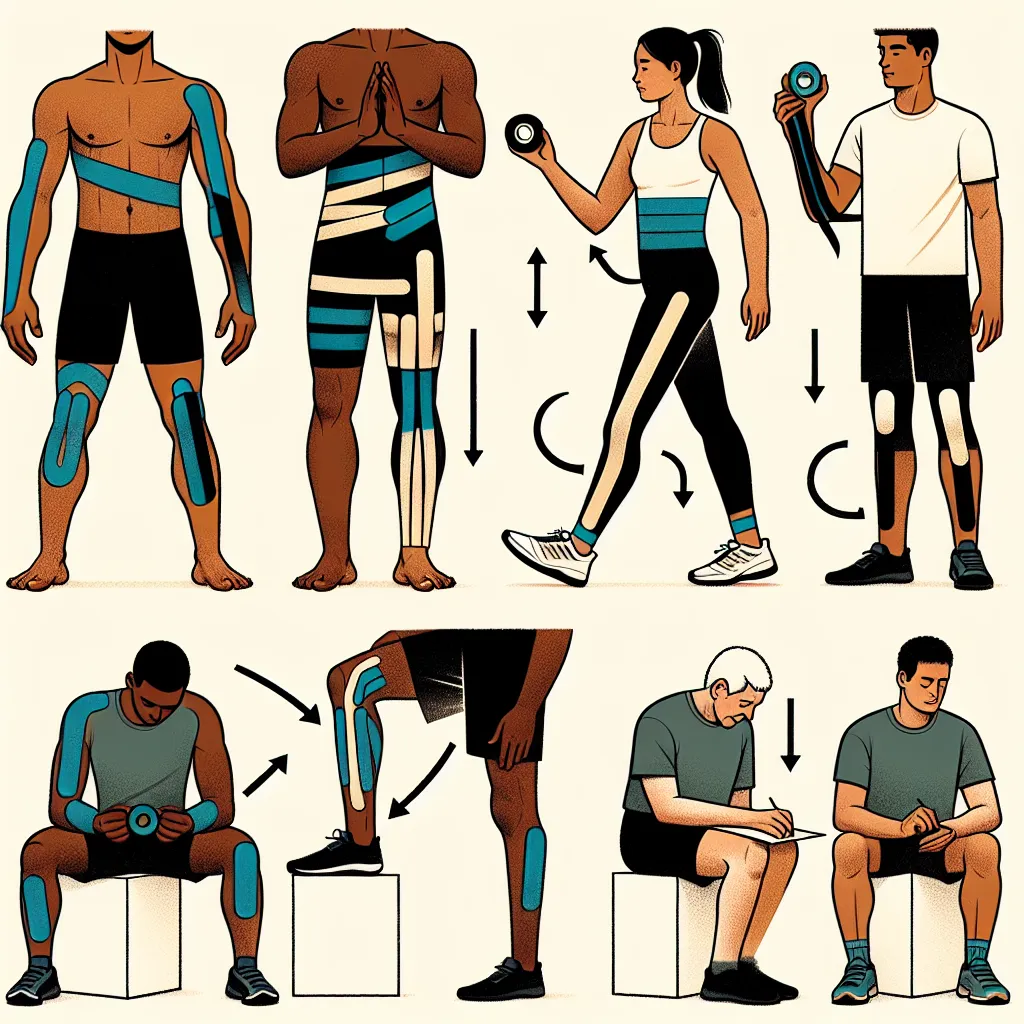Kinesiology tape, also known as kinesio tape or k-tape, is a crucial term in sports medicine and physical therapy. Let’s explore this vocabulary in depth to enhance your IELTS performance.
Definition: Kinesiology tape is an elastic therapeutic tape used to support muscles, reduce pain, and improve circulation.
Part of Speech: Noun
Pronunciation: /kɪˌniːsiˈɒlədʒi teɪp/
Understanding the Context of Kinesiology Tape
Real-World Examples
-
“The physiotherapist applied kinesiology tape to the athlete’s shoulder to provide support during rehabilitation.”
- This sentence demonstrates the use of kinesiology tape in a medical context, specifically for athlete recovery.
-
“Many runners use kinesiology tape on their knees to prevent pain during long-distance races.”
- Here, we see the preventative application of kinesiology tape in endurance sports.
-
“The colorful kinesiology tape on Olympic athletes’ bodies has become a common sight in recent years.”
- This example highlights the visibility and widespread use of kinesiology tape in high-level sports competitions.
-
“Physical therapists often recommend kinesiology tape as a non-invasive treatment for various musculoskeletal issues.”
- This sentence showcases the professional endorsement and versatility of kinesiology tape in treating different conditions.
-
“Some pregnant women find relief from back pain by using kinesiology tape as recommended by their obstetricians.”
- This example illustrates the application of kinesiology tape beyond sports, in this case for pregnancy-related discomfort.

Common Contexts
Kinesiology tape is frequently mentioned in discussions about:
- Sports medicine and athletic performance
- Physical therapy and rehabilitation
- Pain management techniques
- Alternative medicine approaches
- Injury prevention strategies
Frequency in IELTS
While not extremely common, “kinesiology tape” may appear in IELTS Reading passages related to sports, health, or medical advancements. It’s less likely to be a focus in Writing or Speaking tasks but could be relevant in Task 2 essays about health innovations or sports technology.
Analyzing the Vocabulary
Word Structure
- Kinesiology: from Greek “kinesis” (movement) + “-logy” (study of)
- Tape: a simple, common word often used in medical contexts
Synonyms and Related Terms
- Elastic therapeutic tape
- K-tape
- Kinesio tape
- Athletic tape (similar but not identical)
Memorization Techniques
Mind Mapping
Create a mind map with “Kinesiology Tape” at the center, branching out to:
- Applications (sports, therapy, pain relief)
- Properties (elastic, adhesive, water-resistant)
- Colors (often brightly colored)
- Benefits (support, pain reduction, improved circulation)
Mnemonic Device
“Kinetic Energy Needs Elastic Support In Outdoor Laps Or Games You Play” – the first letters spell out “KINESIOLOGY.”
Practical Application
Practice Exercises
- Write a paragraph describing the benefits of kinesiology tape for athletes.
- Create a dialogue between a physiotherapist and a patient explaining how to apply kinesiology tape.
- Compare and contrast kinesiology tape with traditional athletic tape in a short essay.
Repetition and Review
Set reminders to review this term weekly, using it in different contexts each time to reinforce your understanding and recall.
Conclusion
Mastering the term “kinesiology tape” enhances your vocabulary in sports medicine and physical therapy. It’s a valuable addition to your IELTS preparation, particularly for health and sports-related topics. Remember to practice using this term in various contexts to solidify your understanding and improve your ability to use it naturally in the exam.
We encourage you to share your experiences with learning this term or any questions you might have about its usage in the comments section below. How might you incorporate “kinesiology tape” into your IELTS preparation strategy?